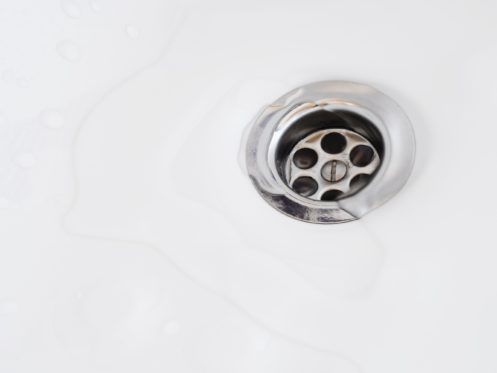Your home’s drains are obviously an important part of your plumbing system, and having them become clogged can wreak havoc. Regular cleaning of your drains is a good way to help prevent clogs from happening in the first place, and these same cleaning methods may also help to eliminate any minor blockages. Still, it is important that you know the right and wrong ways to clean your drains in order to avoid damaging your plumbing.
Why You Should Never Overuse Chemical Drain Cleaner
When it comes to cleaning your drains, one of the biggest surprises to most homeowners is that you should really only ever use a chemical drain cleaner as a last resort. Liquid, gel and foam drain cleaners may seem like a quick, convenient way to eliminate clogs, but they can also cause corrosion or other damage to your pipes. Crystal drain cleaners are even harder on your pipes, which is why most plumbers recommend never to use them
These drain-cleaning products all use chemicals that create a reaction inside the pipe as they work to break down organic material and dissolve the clog. While they are effective at unblocking clogged pipes, they can also begin to eat through your plumbing if you use them too often. Once or twice a year is usually fine, but using them every few weeks is a quick way to ruin your pipes. Moreover, when you do use them, you should make sure to carefully follow the directions and never use more than the recommended amount at one time. This helps minimize the risk to your plumbing. It’s also important to flush your pipes extremely well once the clog is gone to ensure no chemicals remain inside them.
Although there are also a number of natural drain cleaning products on the market, they’re usually not really worth it. Most studies have shown them to only be mildly effective and only for less severe clogs. Moreover, you probably already have multiple items in your home that can work equally as well or better.
Cleaning and Unclogging Your Kitchen Sink
Clogs in your kitchen sink are almost always caused by a combination of fat, oil and grease, which is why they’re commonly referred to as FOG clogs. When you attempt to wash these substances down the drain, they tend to coagulate and become stuck along the interior of your pipes. Over time, this can begin to build up inside your pipes and collect food bits and other particles, eventually resulting in a clog.
If you find yourself facing a partial clog in your sink, there are a few options you can try before calling in professional help. One such option is to simply pour some liquid dish soap down your drain and then flush the drain with a good amount of very hot water. The dish soap works to help cut through the grease and oil while the hot water can help to soften the grease and wash it away. Although some people suggest doing this with boiling water, it is important to note that this can actually soften, deform or otherwise damage PVC pipes. For this reason, it is better to simply turn your sink on to the hottest setting instead.
A mixture of vinegar and baking soda may also help to clean your drains and fix minor clogging issues. In this case, you should first put a few teaspoons of baking soda down the drain and then pour a couple of cups of vinegar over the top. Let this mixture sit inside the drain for approximately 10 minutes and then thoroughly flush the drain with hot water.
Obviously, neither of these two methods will be effective if your drain is fully clogged and the sink is backed up with water. In this case, your best bet is to try to unclog the drain using either a plunger or a pipe snake. Pipe snakes are particularly effective at removing most clogs. This is the preferred tool most plumbers use, and you can usually pick one up for relatively cheap from your local hardware or plumbing supply store.
Cleaning and Unclogging Your Bathroom Sink or Shower Drain
Most bathroom sink clogs are caused by a combination of hair, toothpaste and sometimes dental floss, whereas hair alone is the primary culprit in most shower and bathtub clogs. Generally speaking, these clogs can be tackled in the same way as a clog in your kitchen sink. However, excessive hair in the drain can be especially difficult to get rid of, which is why you should always make every effort to prevent hair from going down the drain when shaving, combing your hair, etc.
The easiest way to do this is to use a drain filter in your shower. If you frequently trim your facial hair over the sink, you may want to use a filter in your bathroom sink or reconsider your shaving habits since this can quickly lead to clogs. Generally, the smaller hairs that you rinse off your razor will easily go down your shower or sink, whereas longer facial hairs and the hair from your head can easily clog the drain.
Unclogging Your Toilet
Cleaning your toilet drain may also become necessary should the toilet get clogged. Your toilet is really only designed to handle human waste and toilet paper, and flushing anything other than this down can quickly create a clog. In this case, attempting to unblock the drain with a plunger is always the first thing to try. If you have one on hand, you could also attempt to clear the drain with a toilet snake or a toilet auger. However, it is important to note that there is a difference between a toilet snake and a regular pipe snake, and using the wrong one could end up damaging your toilet. In fact, most experts recommend that you don’t attempt to use either a snake or an auger on your toilet unless you know what you’re doing. Otherwise, you could break your toilet or damage your plumbing.
What to Do If Your Drains Smell Bad
If you notice bad smells coming up from your drains, the first thing you should do is simply run some water through the drain to make sure the drain trap isn’t dry. If this doesn’t work, you could attempt to flush out the drain with soap and water or baking soda and vinegar as previously mentioned. There are also a number of enzyme products that are designed to counteract the bacteria in your drains in order to stop them from smelling. If none of these methods works, it is probably time to call a plumber. The smells could be a sign that there’s something wrong with your plumbing.
If you’re experiencing a problem with clogged drains in your Sacramento home, Huft Home Services can assist with snaking your drains or even flushing them out with pressurized water. We offer a wide range of plumbing services, and our team also consists of professional HVAC technicians and electricians who can handle any of your heating, cooling and electrical needs. We serve Sacramento, El Dorado, Placer, San Joaquin and Yuba counties. Give us a call today for more information about our services or to schedule an appointment.



